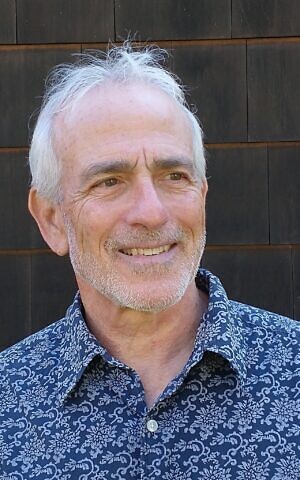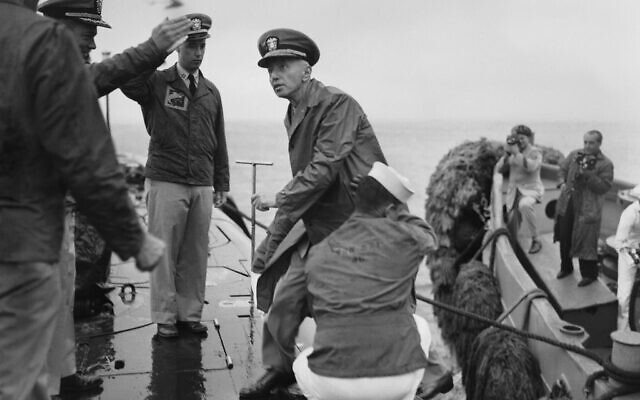Abrasive, controversial and tenacious, Admiral Hyman Rickover was called ‘the greatest engineer to ever live’ by Jimmy Carter. A new biography tells his incredible life story
By RICH TENORIO11 June 2022, 1:17 am9
In the midst of the Cold War in 1958, the underwater journey of the world’s first nuclear-powered submarine transfixed America as it achieved the incredible feat of navigating the polar ice cap.
It came at the right time for the United States, which was looking for a technological breakthrough in response to the launch of Sputnik by the USSR. Yet the man who developed the USS Nautilus — Admiral Hyman G. Rickover, an American Jew who was born in a Polish shtetl — was initially left out of the celebration because his abrasive personality had alienated colleagues in the Navy.
Rickover’s complex life is explored in a new book, “Admiral Hyman Rickover: Engineer of Power,” by Marc Wortman.
“I didn’t know what an extraordinarily complicated, pugnacious and brilliant guy he was, and how much his career was marked by one controversy, one battle, after another,” Wortman told The Times of Israel. “That really was the compelling story to tell.”
Part of the Jewish Lives series from Yale University Press, the book centers on a son of the shtetl who returned to Poland decades later, during a Cold War visit to the Soviet Union with then-vice president Richard Nixon. Later, Rickover became a White House confidant of president Jimmy Carter, who had served in the admiral’s nuclear navy. Carter said that no other man except for his father had such an influence in his life.

Marc Wortman, author of ‘Admiral Hyman Rickover: Engineer of Power.’ (Courtesy)
Known as the father of the nuclear Navy, Rickover built his influence through groundbreaking achievements related to nuclear power, including the debut of the Nautilus in 1954.
“He had the force of personality to get it done,” Wortman said, calling the Nautilus “an unbelievable achievement, an achievement that president Jimmy Carter said made him the greatest engineer ever to live.”
Rickover’s decorated career began during the administration of Woodrow Wilson and lasted into the Reagan years, from World War I to the Cold War, making him the longest-serving active-duty officer in American military history.
“After Nixon, you reach the apogee of Rickover’s power,” Wortman said. “Jimmy Carter was a trained nuclear submarine officer. He revered Rickover… He brought him regularly to the White House, even visited Rickover in his own apartment. He went out on one of the missile-toting submarines in the Rickover Navy. Carter said it was one of the greatest engineering achievements in human history.”
Hard work and serendipity
Rickover was born Chaim Godalia Rykower into an Orthodox Jewish family in 1899’s Poland. The Rykowers left an increasingly antisemitic climate at the turn of the 20th century and young Chaim, aged 6, arrived at Ellis Island with his mother, Ruchia, and sister, Faiga. Abram, the family patriarch, had arrived beforehand but never received news that the rest of the family reached Ellis Island. Lacking financial support, Ruchia, Chaim and Faiga were detained for 10 days. Deportation appeared imminent. Yet an acquaintance from Poland miraculously recognized them and summoned Rykower’s father, ensuring their stay in the US, under Americanized names.
“All the rest of the Jews who remained in his shtetl in Maków Mazowiecki were murdered by the Nazis,” reflected the author. “Who knows how many Rickovers there might have been?”

Rear Admiral Hyman Rickover, father of nuclear-powered submarines, boards the USS Nautilus from the Navy Tug 534 in the Narrows below Brooklyn, New York on August 25, 1958. (AP Photo/Pool)
When the family — including baby daughter Hitel — relocated to the sizable Jewish community of Lawndale, Chicago, serendipitous circumstances connected Rickover with congressman Adolph Sabath, a fellow Jew who got him into the Naval Academy. The family rented a room to a politically connected cousin who brokered a deal to keep a constituent’s son out of WWI in exchange for Rickover going to the academy. Rickover’s intense studiousness helped him prevail in an atmosphere of antisemitism that was mostly subtle, although a vicious yearbook prank against a Jewish classmate attracted national attention.
“Time and time again, it was because of a combination of fight and luck and brilliance that Rickover got ahead and ahead in what he did,” Wortman said, adding, “Also, always, there was the will he had to advance. He worked harder than anybody ever thought possible… even at the point when the Navy relegated him to a back hallway, in an office that was a converted women’s restroom.”
That point was in 1947. By then, Rickover had served aboard multiple types of vessels, seen his leadership ability expand during World War II, and was working to develop a nuclear-powered submarine at the Manhattan Project site of Oak Ridge, Tennessee. His superior and supporter, Adm. Earle W. Mills, grew disillusioned with the rate of progress and relocated Rickover to an office space where the plumbing from toilets was still visible.
However, Wortman said, Rickover “never gave up on the idea. He was going to figure out a way to develop a nuclear-powered reactor.”
Rickover saw the necessary steps, from the production of material to shield the reactor to splitting atoms that would generate heat to power the turbines. The process, which experts estimated would last decades, instead took only five years.
“He was not a person who was going to allow himself to be defeated,” Wortman said. “He would outwork, outfight, outthink anyone.”

Then-US senator Lyndon Johnson points to the polar region on a globe while posing with Rear Adm. Hyman Rickover, center, and Sen. John Stennis (D-Miss.), right, January 6, 1958. (AP Photo/Henry Griffin)
Hard-nosed to a fault
Rickover had his share of detractors. The book devotes a chapter to a moment from 1952, provocatively titled “Another Dreyfus Affair?” It was an “up or out” moment in which Rickover would either be promoted to rear admiral or pushed into retirement, with the decision up to a nine-member committee. Twice, Rickover was passed up for promotion. Yet supporters emerged, including congressman Sabath’s successor, Sidney Yates. Shattering precedent, he received a third vote, and was finally promoted. Wortman concludes that Rickover’s abrasiveness was the main reason his detractors wanted him out.

‘Admiral Hyman Rickover: Engineer of Power,’ by Marc Wortman. (Courtesy/ Yale University Press)
The backlash continued through Rickover’s career, but so did the support. When his foes sidelined him from the celebrations of the Nautilus navigating the polar ice cap, he got sweet revenge as an honored guest at the ticker-tape parade in New York City, plus a Gold Medal from Congress and a bump up in rank, to vice admiral.
Wortman got a sense of just how cantankerous his subject could be from speaking with people who applied to join Rickover’s nuclear Navy.
“Many people had gone through the famous — or infamous — Rickover interview,” Wortman said. “To a person, they remembered it indelibly… not all happily, by any means. There were people he insulted, there were people he left furious, fuming mad. There were people he reduced to shaking. There were people he — the only thing you could say now is, he abused.”
When he learned one candidate was engaged to be married, he ordered him to call his fiance from his desk and cancel the wedding immediately — then promptly dismissed the candidate for having a lack of conviction. Other candidates were banished to a broom closet or — in the case of one who belonged to a chorus — made to sing a Christmas tune to each of Rickover’s female administrative assistants.
Wortman added, “Also, there were people for whom the experience, including Jimmy Carter, was life-altering. They found in that conversation or interview an entirely new perspective on their lives — and also an understanding that if they got into the nuclear Navy, the expectations of them were never less than perfection.”
There have been two nuclear submarines lost in the Navy during the Rickover decades — in 1963 the USS Thresher, with its crew of 129 all dead, and in 1968 the USS Scorpion, with its 99 crew members all presumed lost. In the case of the Thresher, both Congress and a Navy Court of Inquiry ultimately praised Rickover’s strict oversight of the nuclear reactor on the sub while criticizing separate quality-control procedures used by the Navy and the Portsmouth, New Hampshire, shipyard that built the vessel. However, the head of the Naval Bureau of Ships, Vice Adm. Ralph K. James, faulted Rickover for contacting him the night of the disaster and trying to clear himself of any responsibility. As for the Scorpion, Wortman writes that multiple causes for the loss have been suggested but none proven.

Admiral Hyman Rickover, right, greets then-US president Jimmy Carter and first lady Rosalynn Carter at the Brunswick, Georgia, airport, May 27, 1977, as they depart for Port Canaveral, Florida, to tour and ride in the USS Los Angeles submarine. (AP Photo/Charles Harrity)
Wortman said, “We have to remember, one of Rickover’s greatest achievements is that he took something inherently dangerous — radiation is incredibly dangerous — he made it so safe that in tens of millions of miles of ship operations, under the most stormy conditions at sea, under 1,000 feet in places of water pressure under the ocean, there’s never been a radiation release, there’s never been a nuclear accident,” contrasting this favorably with the record of the Soviets and Russians.
A scandal-ridden bon voyage
Rickover’s stay in power ended with a messy breakup under president Ronald Reagan, followed by a messy post-retirement scandal.
“One of the first orders of business of the Reagan administration was to retire him,” Wortman said. “At age 81, he was finally forced out.”

Retired Naval Adm. Hyman Rickover announces the establishment of the Rickover Institute, May 24, 1984. (AP Photo)
It culminated with an expletive-laden 1982 exit interview in the Oval Office, in which Rickover pleaded with president Ronald Reagan to keep his job while cussing out the much younger secretary of the Navy who had forced him out, John Lehman Jr. Two years later, the Navy found that Rickover had accepted nearly $70,000 in gifts from the shipbuilding company General Dynamics. These included “twelve gold-plated fruit knives with handles made from water buffalo horns,” according to the book. The retired admiral received a letter of censure from Lehman but denied that the gifts had affected his decisions in any way.
Twice in the same conversation, Wortman used the word pugnacious to describe Rickover.
“As an author, this was a great gift,” Wortman said. “You couldn’t create a character as complex, as accomplished, as difficult, as just out-and-out angry and mean and pugnacious as Rickover was. So, as an author, you want characters who are rich and full — and by God, Rickover was.”

